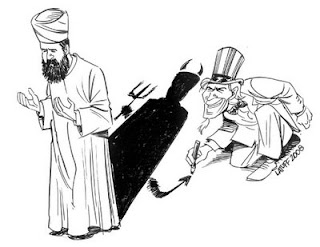 From the June 10 edition of the New York Times:
From the June 10 edition of the New York Times:In the last few months, Muslim groups have encountered unexpectedly intense opposition to their plans for opening mosques in Lower Manhattan, in Brooklyn and most recently in an empty convent on Staten Island.
Some opponents have cited traffic and parking concerns. But the objections have focused overwhelmingly on more intangible and volatile issues: fear of terrorism, distrust of Islam and a linkage of the two in opponents’ minds.
“Wouldn’t you agree that every terrorist, past and present, has come out of a mosque?” asked one woman who stood up Wednesday night during a civic association meeting on Staten Island to address representatives of a group that wants to convert a Roman Catholic convent into a mosque in the Midland Beach neighborhood.
We have entered into perpetual war against Islam. In order to have never-ending war, a necessity for the orderly functioning of the modern superpower, we need an invincible enemy. When I was young it was "Godless atheistic communism," but communism turned out to be vulnerable and collapsed, unable to keep up with endless war's material requirements.
So without missing a beat we found -- actually created -- a new enemy, a dire threat whose menace is omnipresent, whose rage is implacable, and whose character is demonic. George Orwell recognized that the forging of such an enemy is an act of psychological warfare against one's own citizens, and in his novel 1984 uses a book within a book, Emmanuel Goldstein's "Theory and Practice of Oligarchical Collectivism" to explain the psychology of the government and citizens of the modern warfare state.
The consciousness of being at war, and therefore in danger, makes the handing-over of all power to a small caste seem the natural, unavoidable condition of survival. War not only accomplishes the necessary destruction, but accomplishes it in a psychologically acceptable way. In principle it would be simple to waste the surplus labour of the world by building temples and pyramids, by digging holes and filling them up again, or even by producing vast quantities of goods and then setting fire to them. But this would provide only the economic and not the emotional basis for a hierarchical society. What is concerned here is not the morale of the masses, whose attitude is unimportant so long as they are kept steadily at work, but the Party itself. Even the humblest Party member is expected to be competent, industrious, and even intelligent within narrow limits, but it is also necessary that he should be a credulous and ignorant fanatic whose prevailing moods are fear, hatred, adulation, and orgiastic triumph. In other words it is necessary that he should have the mentality appropriate to a state of war.
The "necessary destruction" Orwell speaks of is the destruction of surplus wealth generated by modern industrial societies, which, if it wasn't eaten up by war and weapons, might be spent to educate the people, enhance their prosperity and comfort, and, in the case of Americans, address basic needs such as medical care. Such a population might become too intelligent, difficult to control, and prone to acting in its own self-interest rather than the interests of the state. The superpower prefers a docile and manipulable people to one that is fully conscious and self-interested, and works to repress us by taking steps to keep us ignorant and fearful, and thus in a permanent state of infantile dependency.
And they accomplish this fairly easily. The psychiatrist C.G. Jung was not the first to point out that every human being is aware of the conflict between good and evil constantly occurring in his or her own heart, but he focused with devastating clarity on "the prevailing tendency of consciousness to seek the source of all ills in the outside world," and to project the evil we find within outward onto another. "We can now point a finger at the shadow," Jung declared. "He is clearly on the other side of the political frontier, while we are on the side of good and enjoy the possession of the right ideals."
 This country has been doing its dirty work in the oil-rich Middle East for so long now that it was just a matter of time before violent retaliation, or what the C.I.A. calls "blowback" began to occur, culminating in the 9/11 terrorist attack. Once that happened, it was a simple matter for the ideologues of the three branches of American government -- the administrative bureaucracy, the military, and the Christian churches -- to demonize those we had done wrong, and paint them as the source of all evil.
This country has been doing its dirty work in the oil-rich Middle East for so long now that it was just a matter of time before violent retaliation, or what the C.I.A. calls "blowback" began to occur, culminating in the 9/11 terrorist attack. Once that happened, it was a simple matter for the ideologues of the three branches of American government -- the administrative bureaucracy, the military, and the Christian churches -- to demonize those we had done wrong, and paint them as the source of all evil.Projecting one's own evil impulses onto another is a very dangerous game, especially when people are blissfully unaware that's what they're doing, and Dr. Jung, who has to be the conscience of our time, cautions that "one would...do well to possess some 'imagination for evil,' for only the fool can permanently disregard the conditions of his own nature."
Photo: New York Times, June 10, 2010. Cartoon by Brazilian artist Carlos Latuff, 2008. "1984" was first published by Harcourt Brace in 1949. All quotes from Jung are from "The Undiscovered Self," translated and revised by R.F.C. Hull; Bollingen Series, Princeton University Press, 1990; first published in 1957.
No comments:
Post a Comment